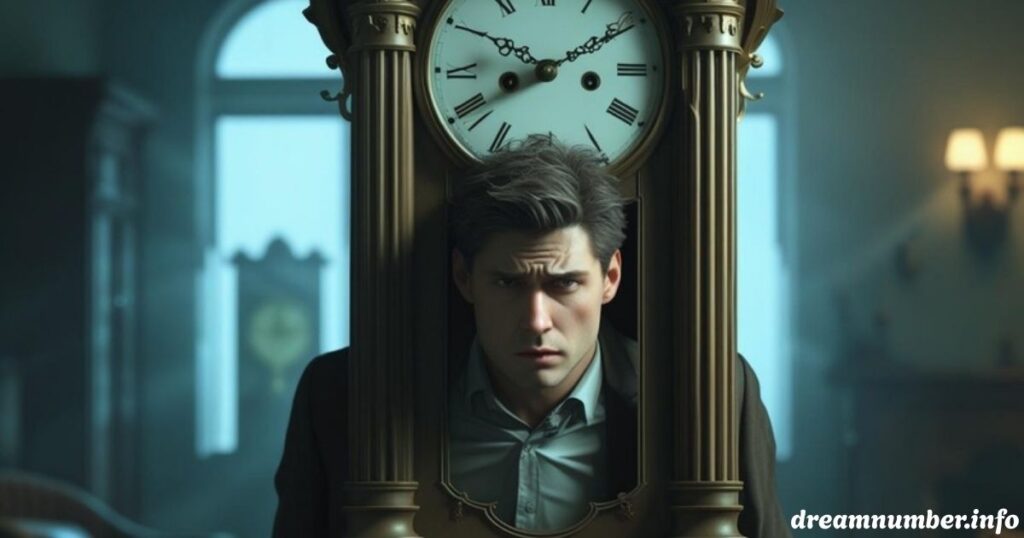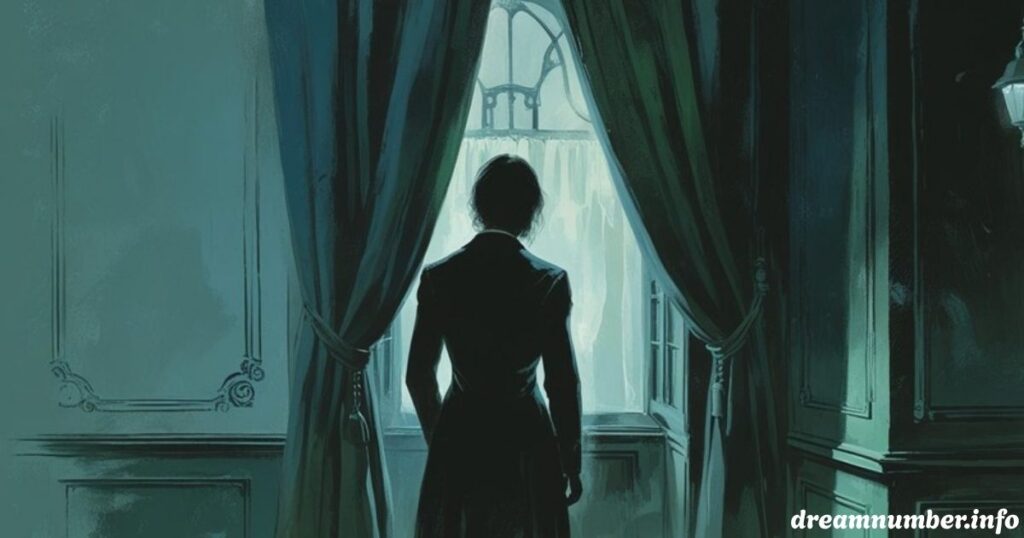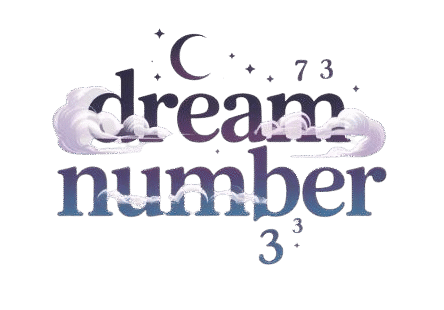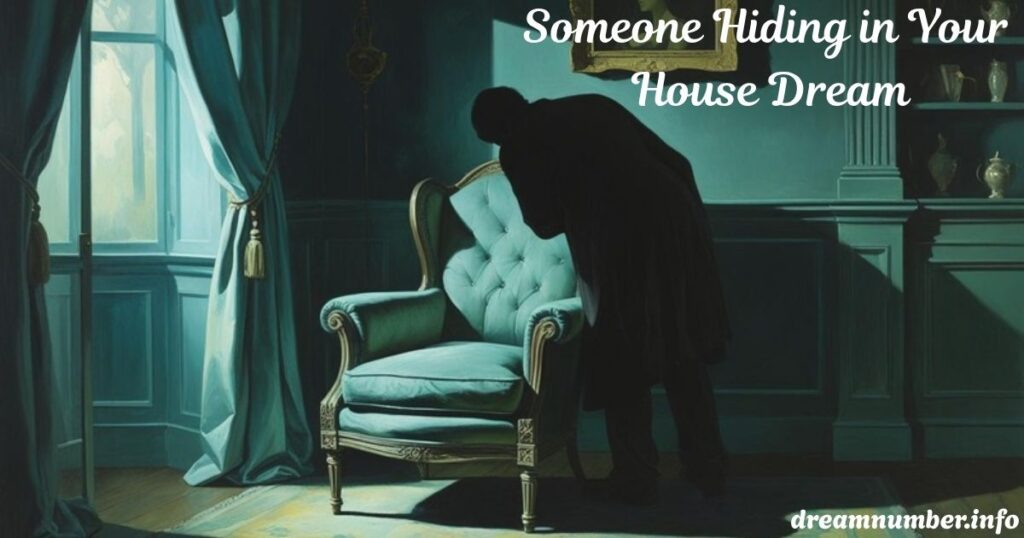Dreams about danger can feel very real. A Someone Hiding in Your House Dream is one of those scary dreams. Many people have this dream. It can leave you feeling uneasy when you wake up. A dream of someone hiding in your house often shows up when you feel unsafe or worried. Sometimes, it means you are facing hidden fears. Other times, it could be about trust or secrets.
You might also have a dream of Someone Hiding in Your House Dream about hiding from someone. These dreams show how you feel about being chased or hiding. A dream of hiding from someone means you may want to avoid problems. Or it could mean you are protecting yourself. If you are dreaming of someone hiding their face, it may mean mystery or unknown threats. All these dreams tell a story about your feelings.
The Psychology Behind Intruder Dreams like Someone Hiding in Your House Dream: What’s Really Hiding?
Intruder dreams, such as someone hiding in your house, often reflect deeper psychological processes. From a Freudian perspective, these dreams symbolize repressed thoughts or desires your mind isn’t ready to confront consciously. Similarly, Jungian analysis interprets these hidden intruders as your “shadow self” parts of your personality that remain hidden but seek acknowledgment. Modern psychology suggests these dreams are your brain’s way of processing daily stress and anxiety, acting like a mental workout to handle emotional challenges.
These dreams frequently tap into feelings of fear, vulnerability, and invasion of personal space, highlighting unresolved conflicts or emotional boundaries. The intruder can represent unknown threats, suppressed emotions, or unacknowledged talents. Whether you’re avoiding confrontation or ready to face your fears, these dreams serve as powerful signals from your subconscious, encouraging personal growth and emotional integration. They reveal what your waking mind may be hesitant to address.
Freudian Perspective: It’s Not Just a Cigar, Folks
From a Freudian viewpoint, intruder dreams symbolize repressed fears or desires lurking in the unconscious mind. The hidden intruder represents parts of yourself or your life you may be avoiding. Freud believed dreams are disguised expressions of unconscious conflicts, so someone hiding in your house might reveal internal struggles or anxieties you haven’t consciously acknowledged, urging you to confront hidden emotions for psychological balance.
Jungian Analysis: Meeting Your Shadow Self
Jungian psychology interprets intruder dreams as encounters with your “shadow self,” the hidden and often rejected parts of your personality. The intruder symbolizes aspects of yourself you deny or fear facing. These dreams invite self-reflection and integration of those shadow elements, encouraging emotional growth. Meeting this hidden figure in dreams helps bring unconscious traits into awareness, promoting wholeness and personal transformation.
Modern Dream Theories: Your Brain’s Nightly Workout
Modern dream theories suggest intruder dreams serve as mental simulations to manage stress and threats. Your brain uses these scenarios to rehearse responses to danger, enhancing emotional resilience. Dreams about someone hiding in your home reflect real-life anxieties about safety or control. By processing these fears at night, your brain strengthens coping skills and prepares you to handle challenges more effectively when awake.
Common Themes in Someone Hiding in Your House Dream: Unpacking Your Mental Luggage
Dreams about someone hiding in your house often reveal feelings of vulnerability, fear, and unresolved stress. These themes reflect your mind’s way of processing hidden anxieties and emotional baggage.
- Fear and vulnerability: Like showing up to school in your underwear, but worse
- Loss of control: When your safe space suddenly feels like a reality show drama
- Hidden threats: That uneasy feeling when you hear footsteps but see no one
- Unresolved stress: Your brain’s way of reminding you there’s baggage you forgot to unpack
- Trust issues: When even the people around you feel like potential plot twists
Variations on a Theme: The Many Faces of the Hidden Intruder

| Dream Variation | Possible Meaning |
| Known intruder | Unresolved issues with that person |
| Unknown intruder | Facing the unknown or your own potential |
| Multiple intruders | Feeling overwhelmed by life’s challenges |
| Hiding from the intruder | Avoiding confrontation in waking life |
| Confronting the intruder | Ready to face your fears or problems |
Emotional Responses: The Feels of the Deal
Emotional responses in intruder dreams reveal deep feelings your subconscious is trying to process. Fear, anxiety, and helplessness often dominate, highlighting your current emotional struggles and unresolved conflicts in waking life.
- Fear: The pounding heartbeat of danger lurking close
- Anxiety: That nervous edge like waiting for bad news
- Helplessness: Feeling trapped with no escape route
- Anger: The fire ignited by violation or threat
- Relief: The breath after facing or escaping the threat
Cultural and Historical Perspectives: Intruders Through the Ages
Throughout history, intruder dreams have reflected societal fears and cultural values. In many ancient cultures, dreams of intruders symbolized external threats like invasions or internal dangers such as betrayal and dishonor. These dreams served as warnings, urging vigilance and protection of one’s community and home. Over time, they also became metaphors for personal and spiritual invasion, highlighting the importance of safeguarding one’s identity and boundaries.
Culturally, the interpretation of intruder dreams varies widely. In Western societies, such dreams often link to anxiety and personal boundaries, while in some Eastern traditions, they may represent spiritual challenges or the presence of negative energies. Modern global influences blend these views, showing how deeply rooted and universally relevant the theme of intrusion remains in the human psyche, crossing time and cultural lines.
Ancient Dream Interpretations
In ancient times, dreams about intruders were seen as omens or messages from the divine. Many cultures believed these dreams warned of impending danger or betrayal. Protecting the home was sacred, so an intruder symbolized a threat not just to physical safety but also to honor, family, and spiritual well-being, making such dreams deeply significant.
Cross-cultural Symbolism of Home Invasion
Across cultures, intruder dreams carry varied meanings but often focus on the idea of violated personal space. In some Native American traditions, intruders represent disruptive forces or lost harmony. In Asian cultures, they may symbolize negative spirits or karmic consequences. Despite differences, these dreams universally reflect fears of intrusion and the need for boundary protection.
Modern Psychological Approaches
Today, psychologists view intruder dreams as expressions of internal conflicts or stress. They often link to feelings of vulnerability, anxiety, or unresolved issues in waking life. Modern theories suggest these dreams help process emotions, rehearse coping strategies, or signal the need to confront personal fears, emphasizing the brain’s role in emotional regulation during sleep.
The Role of Personal Experiences in in Someone Hiding in Your House Dream: Your Life, Your Dreams

Personal experiences deeply shape intruder dreams, reflecting past trauma, fears, or conflicts. These dreams mirror your unique emotional landscape and life challenges, revealing how your mind processes real-life stress through symbolism.
- Past trauma: Shadows from history revisiting your mind
- Relationship conflicts: Hidden tensions surfacing at night
- Recent stressors: Daily anxieties sneaking into dreams
- Trust issues: Fear of betrayal or deception
- Personal boundaries: Struggles with privacy and control
Analyzing the Dream Setting: Home Sweet Dream Home
The setting of your dream, especially your home, symbolizes safety and identity. When intruders appear there, it signals vulnerability or disrupted security. This reflects how your subconscious views your personal space and emotional foundation.
- Familiar rooms turning strange: Feeling unsafe where you should be secure
- Locked doors left open: Boundaries weakening in your life
- Darkness or shadows: Uncertainty clouding your sense of safety
- Altered home layout: Confusion or change in your life’s structure
- Presence of others: Influence of family or friends on your emotional state
The Hidden Intruder: Who’s That Hiding in Your Mental Closet?
The hidden intruder represents unknown fears or suppressed emotions lurking in your psyche. Identifying who or what this figure symbolizes can unlock deep personal insights and unresolved internal conflicts.
- Shadowy figures: Unknown parts of yourself or hidden fears
- Familiar faces in disguise: Repressed feelings toward someone close
- Silent observers: Anxiety about being watched or judged
- Aggressive intruders: Internalized anger or external threats
- Invisible threats: Subconscious worries without clear form
Also Read: Biblical Meaning of Gun in a Dream
Techniques for Interpreting Your Intruder Dream: DIY Dream Detective Work

Interpreting your intruder dream starts with paying close attention to the details,setting, emotions, and characters involved. Keep a dream journal to capture recurring patterns and feelings, which can reveal underlying fears or conflicts.
Ask yourself who the intruder might represent in your waking life,an aspect of yourself or someone else. Use guided imagery or meditation to explore these symbols deeper. Combining reflection with research on dream symbolism empowers you to decode your subconscious messages effectively. Consistency and openness are key to successful DIY dream analysis.
Dream Journaling Methods
Dream journaling is a powerful tool to capture the vivid details of your intruder dreams. Write down your dreams immediately upon waking, noting emotions, settings, and characters. Over time, patterns and symbols emerge that help clarify the subconscious messages. Regular journaling enhances dream recall and deepens self-awareness, making it easier to connect your dream content with real-life feelings or situations.
Guided Visualization Exercises
Guided visualization helps you revisit your intruder dream with calm focus, allowing you to safely explore emotions and hidden meanings. By mentally walking through the dream scene, you can identify symbols and confront fears represented by the intruder. This technique promotes emotional processing and insight, making the dream less threatening and more understandable, aiding in personal growth and healing.
Artistic Expression of Dream Elements
Transforming your intruder’s dream into art,through drawing, painting, or writing,can unlock hidden feelings and meanings. Artistic expression bypasses rational thinking, giving subconscious messages a visual or creative voice. This method encourages emotional release and deeper reflection, helping you externalize fears and see your dream from new perspectives, which supports healing and insight.
Dialogue with the Dream Intruder
Engaging in an imagined conversation with the intruder in your dream allows you to explore the meaning behind its presence. Asking questions like “Who are you?” or “What do you want?” can reveal internal conflicts or suppressed emotions. This technique helps transform fear into curiosity, encouraging self-discovery and empowering you to resolve underlying anxieties linked to the dream.
Transforming Fear into Empowerment: From Nightmare to Night Awesome

Transforming fear into empowerment begins by changing how you perceive your intruder dreams. Instead of seeing them as threats, view these dreams as opportunities to confront hidden anxieties and unresolved conflicts. Embracing this mindset shift helps you reclaim control over your subconscious fears, turning feelings of vulnerability into strength. This process encourages personal growth by revealing what your mind truly needs to address, fostering resilience and confidence both in dreams and waking life.
By actively engaging with the symbols and emotions in your nightmares, you can rewrite their narrative. Techniques like lucid dreaming, dream journaling, or guided visualization empower you to face the intruder with courage rather than dread. This transformation makes your nightmares less intimidating, turning them into powerful tools for self-discovery. Ultimately, what was once a source of fear becomes a catalyst for insight, healing, and renewed mental clarity,your “night awesome” that fuels inner strength.
Lucid Dreaming Techniques
Lucid dreaming allows you to become aware that you’re dreaming while still in the dream state. This awareness lets you actively control the dream’s direction, confront fears, and interact with intruders safely. Techniques like reality checks, meditation before sleep, and setting intentions help increase lucid dream frequency. Practicing this skill can transform terrifying intruder dreams into empowering experiences, providing a unique way to explore your subconscious mind.
Integrating Dream Insights into Waking Life
Dreams often carry valuable messages about our emotions and unresolved issues. Integrating these insights into daily life helps you better understand your fears and motivations. Reflecting on dream themes through journaling or therapy can guide personal decisions and emotional healing. Applying lessons from intruder dreams fosters self-awareness, improves problem-solving skills, and promotes healthier responses to stress, ultimately bridging the gap between the subconscious and conscious mind.
Using Dream Symbolism for Personal Growth
Dream symbolism acts as a coded language of the unconscious, revealing deeper meanings behind intruder dreams. Recognizing symbols such as locked doors or shadowy figures can illuminate hidden fears or desires. By interpreting these symbols thoughtfully, you unlock pathways to self-discovery and transformation. Harnessing dream imagery encourages emotional release, creative thinking, and psychological growth, empowering you to confront challenges with renewed clarity and strength in both dreams and reality.
When to Seek Professional Help: Sometimes You Need a Dream Team
Sometimes, dreams about intruders signal deeper emotional distress or trauma. If nightmares disrupt sleep or cause anxiety, seeking professional help can provide support and effective coping strategies for healing.
- Nightmares cause severe sleep disruption
- Dreams trigger intense anxiety or panic
- Recurring intruder dreams linked to past trauma
- Difficulty distinguishing dreams from reality
- Emotional distress affects daily functioning
Scientific Research on Threat Simulation in Dreams: Lab Coat Time
Scientific research on threat simulation in dreams suggests that dreaming about dangers, such as intruders, serves an evolutionary function. This process allows the brain to rehearse responses to threats in a safe environment, improving survival skills. Studies using brain imaging show heightened activity in fear-related regions during these dreams, supporting the idea that dreams help prepare us for real-life challenges.
Moreover, threat simulation theory explains why nightmares are common and often involve scenarios of invasion or attack. This nightly mental practice sharpens cognitive and emotional resilience, helping individuals better manage stress and fear upon waking, making dreams an essential part of psychological adaptation.
Evolutionary Theories of Threat Rehearsal
Evolutionary theories propose that dreams involving threats, like intruders, function as mental rehearsals for real dangers. These simulations enhance survival by allowing the brain to practice threat detection and response without actual risk. Over generations, this mechanism may have improved humans’ ability to anticipate and avoid harm, making nightmares a protective evolutionary tool rather than just random brain activity during sleep.
Neuroscience of Fear Processing During Sleep
Neuroscientific studies reveal that fear-processing areas in the brain, such as the amygdala, are highly active during threatening dreams. This heightened activity suggests the brain processes and evaluates fear stimuli even while asleep. REM sleep, when most vivid dreams occur, plays a crucial role in emotional regulation, helping individuals process fear memories and potentially reducing daytime anxiety linked to threat experiences.
Studies on PTSD and Intrusion Nightmares
Research on PTSD highlights that individuals often experience intrusive nightmares involving threats or intruders, which replay traumatic events. These distressing dreams can worsen symptoms by reinforcing fear and anxiety. Understanding the neural and psychological mechanisms behind these nightmares aids in developing therapies like imagery rehearsal therapy, aiming to reduce nightmare frequency and help patients regain control over their sleep and emotional well-being.
Creative Expressions Inspired by Intruder Dreams: When Life Gives You Nightmares, Make Art
Intruder dreams often spark powerful creative expressions, helping people process fear and anxiety through art. These creations transform unsettling emotions into meaningful, healing outlets, blending imagination with personal insight.
- Painting dark, mysterious scenes to visualize fear
- Writing stories or poems about overcoming danger
- Composing music that captures tension and release
- Sculpting figures representing hidden parts of the psyche
- Creating digital art to explore dream symbolism visually
FAQ’s
What does a Someone Hiding in Your House Dream mean?
A Someone Hiding in Your House Dream often means you feel threatened or anxious. It shows hidden fears or worries in your life.
Why do I keep having a Someone Hiding in Your House Dream?
Repeated Someone Hiding in Your House Dreams suggests unresolved stress or fears. Your mind is trying to work through these feelings while you sleep.
Is a Someone Hiding in Your House Dream a Warning?
Sometimes a Someone Hiding in Your House Dream warns of real-life trust issues. It may urge you to pay attention to your surroundings or relationships.
What emotions are common in a Someone Hiding in Your House Dream?
Fear and vulnerability are common in a Someone Hiding in Your House Dream. It can make you feel powerless or on edge.
Can Someone Hiding in Your House Dream be Positive?
Yes, Someone Hiding in Your House Dream can help you face fears. It may encourage personal growth and stronger self-awareness.
Conclusion
Someone Hiding in Your House Dream can feel scary and confusing. This dream of someone hiding in your house often shows your hidden fears or worries. Dreaming of someone hiding from you or a dream about hiding from someone means your mind is trying to deal with feelings you may not fully understand. Sometimes, a dream of hiding from someone shows your desire to avoid problems. Dreaming of someone hiding their face can mean there is something unknown or mysterious in your life.
Understanding your Someone Hiding in Your House Dream helps you face your emotions. These dreams are messages from your mind. They can guide you to feel safer and stronger. Keep in mind, a dream of someone hiding in your house is a chance to learn more about yourself. Listen to your dreams and grow from them.

Jason Robert is a dream interpretation expert passionate about unlocking the mysteries of the subconscious. He helps people understand hidden meanings, emotions, and messages behind their dreams for personal growth.






